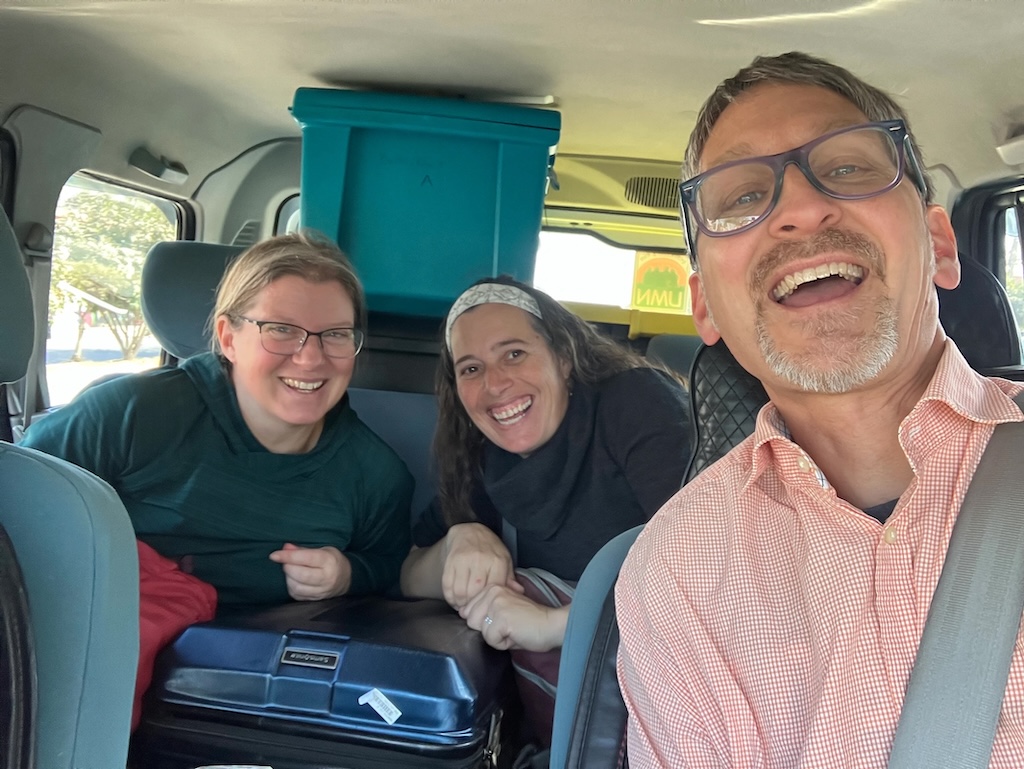Mitch Rhodes
Sometimes these days, work has been disappointing. It’s not the work environment or my co-workers. Recently I’ve been hitting roadblocks in my work to bring expats to UMN, and I’m going to use today’s blog to share some of the frustrations.
Expats coming to Nepal to work need our office staff to help them procure legitimate work visas, for which there seems to be never-ending red tape and fees. We have two full-time Nepali staff to help with this process. They have been working at UMN for decades and know their job well. Each new expat first enters Nepal on a tourist visa which is then converted to a work visa and needs to be renewed every year. Most of our expat visa holders are doctors, and to get the work visa they need to visit three different government offices in Kathmandu, none of which can ever be accomplished on the same day. (Lora and I are non-medical workers so we only have to visit two places.) Yet often mishaps occur and delay the process, which results in the expat, usually a doctor, not being able to start work as soon as they had hoped. Sometimes my job is to explain to the office staff exactly when the expat would like their visa work taken care of. They might, for example, be planning to travel home during such and such a timeframe, and while they are in Kathmandu (coming from their rural hospital) for a few days before their flight, could they do part of the visa work, leaving the rest for when they return from home and are in Kathmandu again– We from the west have ideas of how things should be able to work, yet that isn’t always how things are managed here.
Recently, one expat doctor, let’s call her Sue, wished to move the process up by a week. So instead of coming for visa work in the second week of the next month, she wanted to come in the first week. The problem was this was only three weeks away, in a process that had already started two months prior and is never easy to speed up. So the office staff here said they could do what they could, but couldn’t promise anything. When Sue arrived in Kathmandu to start making the visits to the various government offices (Dept. of Labor, Dept. of Immigration, and Nepali Medical Council) it happened to be a week of many festivals. For some reason, Monday didn’t work out. Tuesday was a festival/holiday and most of the government offices were closed. Wednesday our staff took some documents to one of the offices for official signatures, but after waiting around for a few hours, it became clear that neither of the officials was going to show up that day. Later we learned that one was home sick, and the other had just been in a scooter accident. The next day was Thursday, and although it wasn’t an official Nepali government holiday, the relevant people at that government office were part of the ethnic group (of which there are over 140 in Nepal) that took that day off for a different holiday. Needless to say, the visa process for Sue didn’t get done on time as she had hoped, and she had to end up staying in Kathmandu for an extra week, which meant that her hospital had to manage without her. I found myself managing some of Sue’s frustration and annoyance at the process.
Sometimes it adds insult to injury knowing how much money it takes to get these work visas (and Nepali Medical Council accreditation for medical staff.) Altogether, a single doctor needs to pay about $1,300 each year for the privilege of coming to Nepal and working (for free as a volunteer, supported by their home denomination or church organization). Old-timers remember when the work visa was free, although there was still red tape back then. And if that single doctor has a family, it’s another $1,000 per family member over ten years of age.
Except Americans get a substantial discount because of the “reciprocity visa” agreement between Nepal and the U.S. since about seven years ago. Nepali students coming to the U.S. for college get a discounted rate, and in return, so do Americans who come here for work or study. Recently, however, two UMN Americans were denied the discounted fee and told they needed to pay full price. The immigration office staff and director were all new and claimed no knowledge of the reciprocity agreement. It took four days of visits to the immigration department and our UMN visa staff patiently explaining the reduced fee, demonstrating that other American UMN workers had received it and reminding the staff that these new Americans should get it as well. After four days spent at the immigration office, they got the visa. It reminded me of the parable of the persistent widow from Luke 18.
Another frustration in my work recently has to do with budgets. The church organizations that fund us and the other UMN expats (thank you Presbyterian Church in Canada and Mennonite Mission Network!) have ever-changing budgets –and this fluctuation can also lead to disappointment. Thankfully Lora and I have been spared any funding shortfalls. But recently, a prospective expat, let’s call him Tom, came to visit Nepal to see about a UMN expat job opening that seemed just right. He had been communicating with one of our regular funding partners who were hopeful about offering him a living stipend for his eventual work here. In fact, they had recommended him to us as a candidate soon after we advertised the job opening last summer. So I was very surprised to open an email from this same organization on the very day that Tom was flying back home after his very successful Nepal visit and learn that they no longer had the funds necessary to support his potential work with UMN. Not only no money for Tom, but no money either for another expat who was applying for a different opening at UMN and similarly hoping for their funding. Of course, the lack of funding is beyond the control of anyone I’m in communication with. Yet hope springs eternal, and now I’m busy trying to connect these prospective hires with other agencies for funding. But setbacks like this are frustrating.
Another hard thing at work is when I have to send an email to those eager medical professionals who ask to come and volunteer, but who are not allowed by the Nepali authorities to practice their expertise. Nurses, physician assistants and dentists, for example, are hard to fit into our hospitals. We mostly advertise for general physicians with an MD, or ob-gyns, radiologists, pediatricians, general surgeons or orthopedic surgeons. While I’m at it, I’ll share our webpage of current openings including non-medical posts at the top of the page: https://www.umn.org.np/work-with-us/
The reason we are only advertising for these positions and not in need of nurses is of course a very good and happy one. The scarcity of qualified healthcare professionals that Nepal had experienced for decades has finally eased, and nowadays it is much easier for hospitals to find plenty of nurses when they need them. This is indeed good news for Nepal. It is not the extremely needy case in terms of healthcare that it was longer ago. For some other positions, such as nurse practitioners, physician’s assistants, respiratory therapists, for example, the Nepali Medical Council doesn’t have a category, and so it is hard to find a way to receive these healthcare workers even if they are needed. This too is occasionally a point of frustration.
One thing to note: the postings on our website I linked to above do not mention it, but we often have openings for doctors and other medical staff who can only come for a short time, between 6 – 12 weeks. I’m the one who can help anyone looking for short or long-term service. Well, enough about my job and all its hard parts. Although this post doesn’t make it apparent, I am really enjoying what I do.



